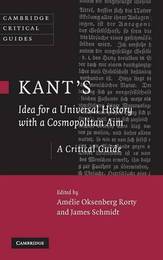
|
Kant's Idea for a Universal History with a Cosmopolitan Aim
Hardback
Main Details
| Title |
Kant's Idea for a Universal History with a Cosmopolitan Aim
|
| Authors and Contributors |
Edited by Amelie Oksenberg Rorty
|
|
Edited by James Schmidt
|
| Series | Cambridge Critical Guides |
|---|
| Physical Properties |
| Format:Hardback | | Pages:270 | | Dimensions(mm): Height 235,Width 162 |
|
| Category/Genre | History of Western philosophy |
|---|
| ISBN/Barcode |
9780521874632
|
| Classifications | Dewey:901 |
|---|
| Audience | | Tertiary Education (US: College) | |
|---|
|
Publishing Details |
| Publisher |
Cambridge University Press
|
| Imprint |
Cambridge University Press
|
| Publication Date |
29 May 2009 |
| Publication Country |
United Kingdom
|
Description
Lively debates about narratives of historical progress, the conditions for international justice, and the implications of globalisation have prompted a renewed interest in Kant's Idea for a Universal History with a Cosmopolitan Aim. The essays in this volume, written by distinguished contributors, discuss the questions that are at the core of Kant's investigations. Does the study of history convey any philosophical insight? Can it provide political guidance? How are we to understand the destructive and bloody upheavals that constitute so much of human experience? What connections, if any, can be traced between politics, economics, and morality? What is the relation between the rule of law in the nation state and the advancement of a cosmopolitan political order? These questions and others are examined and discussed in a book that will be of interest to philosophers, social and political theorists, and intellectual and cultural historians.
Author Biography
Amelie Oksenberg Rorty is Lecturer in Social Medicine, Harvard University and Visiting Professor in Philosophy, Boston University. James Schmidt is Professor of History and Political Science at Boston University.
Reviews"... Idea presents us with a historical account of both the history and the continued prospects for the development of a truly moral society... explores the conditions for the possibility of morality becoming something we actually live by rather than merely being capable of..." --Stefan Bird-Pollan, Harvard University, Concurring Opinons
|